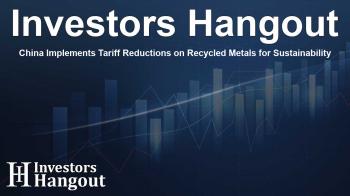China Implements Tariff Reductions on Recycled Metals for Sustainability

China's Tariff Reductions on Recycled Copper and Aluminium
In a significant move towards sustainability, China has announced a reduction in import tariffs on specific recycled copper and aluminium raw materials. This decision was revealed by the government, indicating its commitment to enhancing import levels of high-quality products while nurturing domestic demand.
Details of the Tariff Adjustments
The Ministry of Finance specified that from the start of the next year, there will be several tariff adjustments across various categories to better align with China’s goals for high-level economic opening. This adjustment will see provisional import tariffs set lower than the established most-favoured nation rates on 935 different items.
Focus on Green Development
The newly introduced tariff reductions particularly on ethane and recycled copper and aluminium support China’s broader agenda for green and low-carbon development. The initiative not only enhances import opportunities but also encourages a shift towards more sustainable practices within the industry.
Other Tariff Changes
While tariffs on essential green materials are being lowered, it is worth noting that taxes will rise on some other commodities. Items like molasses and certain sugar-containing pre-mixed powders will experience increased tariffs. Conversely, reductions will also apply to cyclic olefin polymers, ethylene-vinyl alcohol copolymers, as well as specific automatic transmissions used in special-purpose vehicles, including fire trucks.
Impact of the China-Maldives Free Trade Agreement
Additionally, the government highlighted that the China-Maldives Free Trade Agreement is set to take effect on January 1, which is expected to further bolster trade relations between the two nations. The agreement includes provisions for the timely implementation of tariff reductions that aim to promote collaborative economic growth.
Further Implications for the Market
The implications of these tariff changes are profound. By reducing import duties on recycled materials, China is enhancing its position in the global market, driving up the quality of raw materials sourced whilst laying foundations for strong environmental policies. This shift is likely to attract more investments in recycling operations which could provide a boost to domestic production capabilities.
Frequently Asked Questions
Why is China reducing tariffs on recycled copper and aluminium?
The rate reduction is part of China's broader strategy to enhance quality imports, promote domestic demand, and further green development initiatives.
When do these tariff changes take effect?
The tariff adjustments are set to take effect on January 1 of the coming year.
What are the broader implications of these tariff reductions?
These changes aim to position China favorably in the global market by promoting sustainable practices in recycling and reducing costs on essential materials.
Are tariffs being increased on any commodities?
Yes, some commodities will face increased tariffs, including molasses and certain sugar-containing pre-mixed powders.
What does the China-Maldives Free Trade Agreement entail?
This agreement focuses on enhancing trade relations with tariff reductions aimed at promoting joint economic growth between the two nations.
About Investors Hangout
Investors Hangout is a leading online stock forum for financial discussion and learning, offering a wide range of free tools and resources. It draws in traders of all levels, who exchange market knowledge, investigate trading tactics, and keep an eye on industry developments in real time. Featuring financial articles, stock message boards, quotes, charts, company profiles, and live news updates. Through cooperative learning and a wealth of informational resources, it helps users from novices creating their first portfolios to experts honing their techniques. Join Investors Hangout today: https://investorshangout.com/
Disclaimer: The content of this article is solely for general informational purposes only; it does not represent legal, financial, or investment advice. Investors Hangout does not offer financial advice; the author is not a licensed financial advisor. Consult a qualified advisor before making any financial or investment decisions based on this article. The author's interpretation of publicly available data shapes the opinions presented here; as a result, they should not be taken as advice to purchase, sell, or hold any securities mentioned or any other investments. The author does not guarantee the accuracy, completeness, or timeliness of any material, providing it "as is." Information and market conditions may change; past performance is not indicative of future outcomes. If any of the material offered here is inaccurate, please contact us for corrections.
